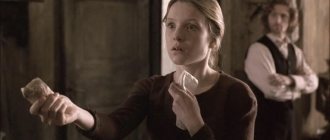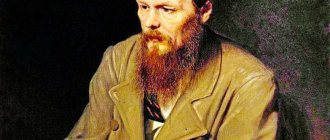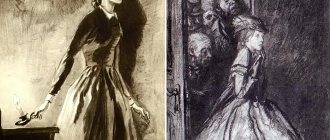Pyotr Petrovich Luzhin is a character in the novel “Crime and Punishment” (1866) by Fyodor Mikhailovich Dostoevsky. The groom of Dunya Raskolnikova, the sister of the main character of the novel, Rodion Raskolnikov. Court Counselor; distant relative of Marfa Petrovna Svidrigailova. For the first time he “appears” in a letter from Pulcheria Alexandrovna Raskolnikova to her son. Pulcheria Alexandrovna imagines Luzhin almost as a knight on a white horse. After all, this sweet man wooed her dowry daughter, Rodion’s sister, despite the plight of her family. He is ready to marry Duna and would like to meet her brother. Only a noble and worthy person is capable of such a “feat,” the elderly lady believes:
“He is a businesslike and busy man, and is now in a hurry to St. Petersburg, so he values every minute.”
— Part 1, chapter III.
From a letter from his mother to Raskolnikov Nevertheless, despite the generally positive description of his mother, Rodion Raskolnikov immediately exposes Luzhin’s petty soul. Later, Pulcheria Alexandrovna understands that only the external impression of Luzhin is positive; in fact, he is a stingy, mean, vain and petty type.
Andrey Zibrov as Pyotr Petrovich Luzhin in the TV series “Crime and Punishment” (2007)
Short description
Luzhin is 45 years old.
He is a lawyer, court councilor. A narcissistic person who values money above all else. A distant relative of Marfa Petrovna Svidrigailova, who, having learned that her husband is in love with their governess Dunya Raskolnikova, introduces the girl to Luzhin. Dunya becomes Luzhin's bride and follows him to St. Petersburg. Arrival in St. Petersburg and meeting Rodion Raskolnikov develops into a quarrel. Raskolnikov immediately recognizes a low person in Luzhin and becomes his enemy. Hoping to deal with the annoying “youngster,” Luzhin frames his good friend, the harmless Sonya Marmeladova, and accuses her of theft. At a wake for her father, the scoundrel quietly slips money into the girl’s pocket and publicly accuses her of theft. However, Luzhin’s plan failed - his friend Lebezyatnikov says that Luzhin himself slipped a hundred-ruble ticket into Sophia’s pocket.
This is where Dunya’s relationship with Luzhin begins to deteriorate. The last time Pyotr Petrovich is mentioned is at the end of the novel at Dunya’s wedding with Razumikhin.
Quoted description of Luzhin
Pyotr Petrovich is 45 years old, but he has a pleasant appearance and “can still please women”:
“He is a trustworthy and wealthy man, he serves in two places and already has his own capital. True, he is already forty-five years old
, but he is quite pleasant-looking and can still please women, and in general he is a very respectable and decent person, just a little gloomy and seemingly arrogant.
— Part 1, Chapter III
He serves as a lawyer and holds the post of court councilor:
“He is already a court councilor, Pyotr Petrovich Luzhin...” - Part 1, Chapter III
“He is a reliable and wealthy man, he serves in two places and already has his own capital.” — Part 1, chapter III
Luzhin plans to open his own law office in St. Petersburg:
“I have already mentioned that Pyotr Petrovich is now leaving for St. Petersburg. He has big business there, and he wants to open a public law office in St. Petersburg. He has been involved in various lawsuits and litigation for a long time, and recently he just won one significant lawsuit.” — Part 1, chapter III
He rose into the ranks of the people from the bottom, “from insignificance”:
“...Petr Petrovich, having fought his way out of insignificance...” - Part 4, Chapter III
Luzhin did not receive a good education, but at the same time he is an intelligent person, according to Pulcheria Raskolnikova:
“...he is a man, although he has little education, but he is smart...” - Part 1, Chapter III
More than anything in the world, Mr. Luzhin loves his money:
“But more than anything in the world, he loved and valued his money, obtained by labor and by all means: it equated him with everything that was higher than him...” - Part 4, Chapter III
Appearance
The appearance of Pyotr Petrovich Luzhin is described in detail in the scene of his first visit to Rodion Raskolnikov:
“ He was a gentleman of middle age, prim, dignified, with a cautious and grumpy physiognomy
, who began by stopping at the door, looking around with offensively undisguised surprise and as if asking with his eyes: “Where did I end up?...” All his clothes were fresh from the tailor, and everything was good, except perhaps that only that everything was too new and too revealing of a well-known goal.
Even the smart, brand new, round hat testified to this goal: Pyotr Petrovich somehow treated it too respectfully and held it too carefully in his hands. Even a lovely pair of lilac, real Jouvenev gloves testified to the same thing, if only for the fact that they were not worn, but only carried in the hands for the parade. In Pyotr Petrovich’s clothes, light and youthful colors predominated. He was wearing a nice summer jacket of a light brown shade, light light trousers, the same vest, freshly bought thin underwear, the lightest cambric tie with pink stripes, and best of all: all this even suited Pyotr Petrovich. His face, very fresh and even handsome, already seemed younger than his forty-five years.
Dark sideburns pleasantly overshadowed him on both sides... Even his hair... combed and curled at the hairdresser, this circumstance did not present anything funny or any kind of stupid look, which usually always happens with curled hair, for it gives the face an inevitable resemblance to a German walking down the aisle .
If there was anything really unpleasant and repulsive in this rather beautiful and respectable face, it was due to other reasons
”
- Part 2, Chapter V
Luzhin's character
Pyotr Petrovich Luzhin gives the impression of a respectable, gloomy and arrogant person, as Pulcheria Alexandrovna wrote to her son:
“... in general he is a very respectable and decent person, only a little gloomy and, as it were, arrogant.” — Part 1, chapter III
He tries to appear pleasant in society, but when things don't go the way he wants, he loses all self-control and becomes like a "sack of flour":
“... Pyotr Petrovich belonged to the category of people, apparently extremely amiable in society and especially pretending to be polite, but who, just because of them, immediately lose all their means and become more like sacks of flour than cheeky and gentlemen revitalizing society..." - Part 4, Chapter II
He is a very vain person and loves to be listened to:
“He said a lot more, because he was somewhat vain and really loved to be listened to...” - Part 1, Chapter III
“He was apparently trying to make a profitable impression, and vanity overcame prudence...” - Part 2, Chapter V
He is used to admiring himself and highly values his mind:
“Pyotr Petrovich, having risen from insignificance, became painfully accustomed to admiring himself, highly valued his intelligence and abilities, and even sometimes, alone, admired his face in the mirror.” — Part 4, chapter III
The image of Luzhin in the novel Crime and Punishment
This is what Dostoevsky originally planned to call his book. The idea for the novel arose during his stay in hard labor. Here Dostoevsky heard the interesting story of one student who served as the prototype for Raskolnikov. The concept of the work gradually transformed. From a short story it turned into a voluminous novel depicting the clash of immoral ideas with the logic of life.
This is a man of forty-five years old, with the rank of court councilor. It is worth saying that the title is quite honorable: it grants the right to personal nobility. Pyotr Petrovich Luzhin is a dignified, prim gentleman with a “squeamish, cautious physiognomy.” The image of the hero Luzhin in the novel Crime and Punishment is somewhat comical. He is the fiance of the main character's sister. When he first meets a student, he wears fashionable, expensive clothes. He looks like he just came out of the tailor's. Pyotr Petrovich wears a smart round hat and handles this element of his attire with extreme caution. On his hands is a pair of lilac gloves, which, like other items of clothing, are new, acquired not so long ago. There is something artificial and fake in the appearance of this gentleman.
But still, there is something that unites these heroes - theories based on the principle of permissiveness. Luzhin’s theory of “the whole caftan” puts reasonable egoism on a pedestal, when people first of all think about their own happiness, that is, in essence, it allows a person to act exclusively in his own interests, regardless of moral standards. Raskolnikov's theory has a different meaning: he divides people into ordinary and exceptional, that is, those who are capable of going towards their goal and leading others by any means. But still, both theories allow a person to do whatever he wants, albeit for completely different purposes: Luzhin talks about personal gain, and Raskolnikov talks about social progress. The first meeting of Luzhin and Raskolnikov is indicative in this regard: smart, dressed in elegant new clothes, Luzhin is at first clearly embarrassed to be in Rodion’s cramped room among students barely making ends meet, and Raskolnikov is disgusted by Luzhin’s individualism, ready to ruin Dunya’s life for his own convenience. But when Luzhin speaks with horror about the immorality of killing the old pawnbroker, Rodion objects to him, believing that everything happened according to Luzhin’s theory. It turns out that despite all the internal differences between these characters and despite the fact that at first glance they are not similar to each other, their theories lead to one thing - they allow a person to commit a crime.
Philosophical novel by F.M. Dostoevsky’s “Crime and Punishment”, cultural scientist and literary critic M.M. Bakhtin called it polyphonic because in it, like in a piece of music, different voices sound and intertwine with each other, embodying different ideologies and worldviews. Among them, the voice of Rodion Raskolnikov especially stands out. Throughout the novel, the author tests his theory by introducing doubles of the hero into the narrative. One of them is Pyotr Petrovich Luzhin.
We recommend reading: What types of orders are divided into Dow in 2021
Dostoevsky about Luzhin
In the draft materials for the novel about Luzhin, in particular, it is said:
“With vanity and self-love, to the point of coquetry, pettiness and a passion for gossip. <…> He is stingy. His stinginess is something out of Pushkin’s Stingy Baron. He bowed to money, for everything perishes, but money will not perish; I, they say, come from a low rank and definitely want to be at the top of the ladder and dominate. If abilities, connections, etc. They skimp on me, but they don’t skimp on money, and therefore I bow to money...” - From drafts of the novel
Luzhin and Raskolnikov
At first glance, these heroes in the work have nothing in common. Raskolnikov is tormented by his ideas. He was never able to implement them. Luzhin is calm and reasonable. He does not know the idealism of fans of Napoleonic genius. He is just a businessman who is familiar with the philosophy of “petty egoism.” With this way of thinking, you can live happily ever after, without torment or suffering. But petty selfishness has something in common with the idea of “entitled people.” The similarity lies in the rejection of basic Christian principles.
Raskolnikov dislikes Luzhin even before their first meeting. He learns about the role of this gentleman in the fate of his sister from a letter to his mother. The feeling that the main character experiences when meeting him is reminiscent of disgust. But later he notices with horror that they have something in common.
Dostoevsky created an authentic and realistic image of Luzhin in the novel Crime and Punishment. A summary of the hero's characteristics is presented in this article. But the writer’s extraordinary ability to express the deepest and subtlest aspects of reality can be felt only after reading the novel in its entirety. Dostoevsky's realism is a unique phenomenon not only in Russian, but also in world literature.
Failed marriage with Dunya Raskolnikova
Pyotr Petrovich Luzhin had long dreamed of a girl of lower status than him, hoping that she would be grateful and, as a result, submissive to him:
“For a long time, for several years now, he dreamed with sweetness of marriage, but he kept saving up money and waiting. He ecstatically thought, in the deepest secret, about a well-behaved and poor girl (definitely poor), very young, very pretty, noble and educated, very frightened, who had experienced a great many misfortunes and was completely humbled before him, one who would consider him all her life her salvation, she was in awe of him, she obeyed, she was amazed at him, and only him.” — Part 4, chapter III
Dunya Raskolnikova, whom Marfa Petrovna introduced him to, even exceeded his dreams:
“And now the dream of so many years was almost coming true: Avdotya Romanovna’s beauty and education amazed him; her helpless position provoked him to the extreme. Here there appeared even a little more than what he had dreamed of: a proud, characterful, virtuous girl appeared, with education and development superior to him (he felt this), and such and such a creature would be slavishly grateful to him all his life for his feat and would reverently annihilate himself before him , and he will rule limitlessly and completely!..” - Part 4, Chapter III
Dunya agrees to marry him, but not out of love, but hoping in this way to help the family get out of poverty:
“...I was flattered by his money, but I swear, brother, I never imagined that he was such an unworthy person. If I had seen it earlier, I would not have been flattered by anything! Don’t blame me, brother!..” - Part 4, Chapter III
Initially, he made a good impression on Dunya and her mother, but after the engagement, Luzhin’s true nature began to emerge. Knowing about their poverty, he hardly helps them move to St. Petersburg. Luzhin pays for the transportation of luggage (which is inexpensive), but does not pay for the travel of the bride and her mother (which is much more expensive). Poor Dunya and her mother are forced to travel to St. Petersburg third class with borrowed money:
“Yes, and here the business man cheated them a little: the luggage costs less than their fare, and, perhaps, it will go for nothing.” — Part 1, chapter IV
“After all, what’s important here is: it’s not stinginess, it’s not skimping that’s important, but the tone of it all.” — Part 1, chapter IV
Afterwards he also reproached the Raskolnikovs for having incurred “costs” transporting their luggage:
“In costs? What are these costs? Are you talking about our chest? But the conductor brought it to you for free.” — Part 1, chapter IV.
Pulcheria Alexandrovna lost her temper. At the same time, having heard the truth about himself from Raskolnikov, Luzhin is offended (or pretends to be offended):
“Avdotya Romanovna,” Luzhin said, cringing, “your words are too meaningful for me, I’ll say more, even offensive, in view of the situation, which I have the honor to occupy in relation to you." — Part 4, chapter II
“Oh, leave all this touchiness, Pyotr Petrovich... and be the smart and noble person that I have always considered you and want to consider you...” - Part 4, Chapter II.
Dunya, about their discord with Raskolnikov But in fact, he was offended by “that two poor and defenseless women could get out from under his power”:
“He swaggered to the last line, not even imagining the possibility that two poor and defenseless women could get out from under his power. This conviction was greatly helped by vanity and that degree of self-confidence, which is best called narcissism.” — Part 4, chapter III
And from Raskolnikov he was preparing to listen to compliments, not insults, addressed to him. In his opinion, marrying the beggar Dunya with a tarnished reputation was a feat, and he could not understand “how others could not admire his feat”:
“Having then come to visit Raskolnikov, he entered with the feeling of a benefactor preparing to reap the fruits and listen to very sweet compliments. And, of course, now, coming down the stairs, he considered himself extremely offended and unrecognized.” — Part 4, chapter III
After Luzhin tried to frame Sonya to prove that he was right and, by sparing her to show his “nobility,” his low soul becomes obvious to everyone. Even Lebezyatnikov, whom he called a friend, disavows Luzhin:
“Oh, this is where you went! - Lebezyatnikov shouted. - You're lying! Call the police, and I will take the oath! I just can’t understand one thing: why did he risk such a base act! O pitiful, vile man!
»
— Part 5, Chapter III
More about the relationship between Luzhin and Dunya Raskolnikova
World of Dostoevsky
Life and work of Dostoevsky. Analysis of works. Characteristics of heroes
Mr. Luzhin is one of the most striking images in the novel “Crime and Punishment” by Dostoevsky.
This article presents a quotation image of Luzhin in the novel “Crime and Punishment”: a table describing the appearance and character, a portrait of the hero in quotes.
See: All materials on “Crime and Punishment”
All articles about Luzhin
The image of Luzhin in the novel “Crime and Punishment”: table with description, portrait in quotes
Luzhin and his theories
In the novel Crime and Punishment, Mr. Luzhin is a proponent of several interesting theories.
Luzhin supports the theory of poor and grateful wives. The idea was that the wife should be poor and appreciate her husband for saving her from poverty. That is why he decides to marry the poor, but beautiful and educated Duna Raskolnikova.
Luzhin and Dunya Raskolnikova
Luzhin proposes to poor Duna Raskolnikova after an unpleasant incident happens to her in the Svidrigailovs' house, where the girl works as a governess. The father of the family, Mr. Svidrigailov, falls in love with Dunya, who is 2 times younger than him. Marfa Petrovna, Svidrigailov's wife, blames Dunya for everything and undeservedly disgraces her throughout the city.
Soon, having learned the truth, Marfa Petrovna restores Dunya's reputation and finds a groom for her - Mr. Luzhin. Dunya accepts Luzhin's offer in order to save her family from poverty.
As a result, Luzhin's marriage to Dunya is canceled after the vile and deceitful nature of the groom is revealed. Disappointed in Luzhin, Dunya refuses to marry him.
Prototypes of Luzhin in the novel “Crime and Punishment”
- Lyzhin Pavel Petrovich
is a sworn attorney with whom Dostoevsky was familiar. The name Lyzhin appears in the draft materials for the novel Crime and Punishment. The author, apparently, changed one letter in Lyzhin’s surname. As a result, we got a well-known character with a telling surname - Luzhin. - Karepin Petr Andreevich
could also become another prototype of Luzhin. Karepin was the husband of Dostoevsky's sister. He married Dostoevsky's 18-year-old sister at the age of about 45. After the death of the writer's father, Karepin also became the Dostoevskys' guardian. This is very similar to Luzhin, who wanted to marry Duna at the age of 45, and was also Lebezyatnikov’s guardian. - Dostoevsky
can also be considered one of Luzhin's prototypes. At the time of writing Crime and Punishment, Dostoevsky was about 45 years old, and he, like Luzhin, was wooing his future second wife, a young girl, Anna Grigorievna Snitkina.
This was a quotation image of Luzhin in the novel “Crime and Punishment”: a table with a description of appearance and character, a portrait of the hero in quotes, a description of Luzhin’s prototypes, a presentation of Luzhin’s theories, etc.
www.alldostoevsky.ru
Luzhin's theory about the whole caftan
The prudent Mr. Luzhin adheres to the theory of a whole caftan.
According to this theory, people should pursue only personal interests and “love yourself alone”: “Science says: love yourself first, first of all, for everything in the world is based on personal interest. If you love yourself alone, then you will manage your affairs properly, and your caftan will remain intact...” - Part 2, Chapter V
According to Luzhin's theory, all people should think first of all about their own well-being, and not the well-being of others. That is, supposedly you shouldn’t share your caftan with someone, since in the end both will have only half of the caftan, that is, in fact, both will be left without a caftan.
Prototype
Luzhin's prototypes were probably the jury attorney Pavel Petrovich Lyzhin, one of Dostoevsky's creditors, whose name is mentioned in the draft materials for Crime and Punishment, and P.A.
Karepin is the husband of the writer’s sister. In 1840, Karepin married Varvara Mikhailovna Dostoevskaya, who was 26 years younger than him, and soon became the guardian of her younger brothers and sisters. Fyodor Mikhailovich never met him, but he carried on correspondence, from which he compiled a negative image of Karepin. In addition, according to N. Nasedkin, there is some similarity between Luzhin’s actions and the circumstances of Dostoevsky’s life: during the creation of Crime and Punishment, 45-year-old Dostoevsky, like 45-year-old Luzhin, wooed a young girl - A. G. Snitkina , which in turn was one of the prototypes of Dunya Raskolnikova.
Luzhin's actions in the novel Crime and Punishment
The hero attaches great importance to clothing. He dresses stylishly, one might say, dandyishly, preferring light, youthful colors. The jackets and trousers are light colors, everything is new, as if they had just been sewn, and there is a fashionable round hat on the head. Luzhin’s indispensable attribute is “real Jouvenian” gloves, which are usually carried in the hands without being put on. The cambric scarf is fragrant with perfume, and around the neck is a cambric tie in pinkish tones. The look is completed with a gold lorgnette and a massive ring with a yellow gemstone. It is not surprising that with such data, a man enjoys increased attention from women.
Soviet literary critic L.P. Grossman established that Luzhin’s prototype was the writer’s creditor Pavel Petrovich Lyzhin, to whom Dostoevsky at one time owed 450 rubles. Another proof of this is Lyzhin’s opening of a law office in St. Petersburg, which is what the character in Dostoevsky’s novel also dreams of.
15 Apr 2021 klasterlaw 224
Share this post
- Related Posts
- Mandatory personnel logs 2021
- Until what age does a father see his child in front of his mother?
- What is required for 3 children in 2021 Barnaul
- Leave for parents of disabled children in 2021




